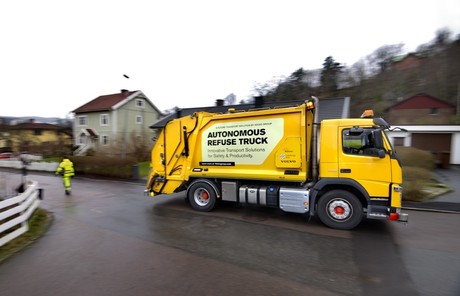Safer autonomous refuse truck currently under trial

An autonomous refuse truck is being tested by Volvo Trucks and Renova.
It is hoped that the vehicle will contribute to safer and more efficient refuse handling, as well as creating a better work environment for drivers.
“Driving a heavy commercial vehicle in an urban residential area with narrow streets and vulnerable road users naturally imposes major demands on safety, even when the vehicle’s speed doesn’t exceed a normal walking pace,” said Carl Johan Almqvist, traffic and product safety director, Volvo Trucks.
“The refuse truck we are now testing continuously monitors its surroundings and immediately stops if an obstacle suddenly appears on the road. At the same time, the automated system creates better prerequisites for the driver to keep a watchful eye on everything that happens near the truck.”
The first time the automated refuse truck is used in a new area, it is driven manually while the onboard system constantly monitors and maps the route with the help of sensors and GPS technology. The next time the truck enters the same area, it knows exactly which route to follow and at which bins it has to stop.
At the first stop with the automated system activated, the driver climbs out of the cab, goes to the rear of the truck, brings out the wheelie bin and empties it exactly the way the job is done today by operating the relevant controls. When the operation is completed, the truck automatically reverses to the next bin upon receiving the driver’s command. The driver walks the very same route that the truck takes and thus always has full view of what is happening in the direction of travel.
“By reversing the truck, the driver can constantly remain close to the compactor unit instead of having to repeatedly walk between the rear and the cab every time the truck is on the move. And since the driver doesn’t have to climb in and out of the cab at every start and stop, there’s less risk of work-related injuries such as strain on the knees and other joints,” said Hans Zachrisson, strategic development manager at Renova.
Reversing is otherwise a fairly risky manoeuvre since the driver may find it difficult to see who or what is moving behind the vehicle, even if it is fitted with a camera. In certain areas it is not allowed to reverse with a heavy commercial vehicle for safety reasons, in others it is a requirement that a co-driver must stand behind the truck to ensure that the road is clear before the vehicle is allowed to reverse. The solution being tested is designed to eliminate these issues.
Since sensors monitor the area all around the refuse truck, driving is equally safe no matter the direction in which the vehicle is moving. And if for instance the street is blocked by a parked car, the refuse truck can automatically drive around the obstruction provided there is sufficient space alongside.
Given that the automated systems optimise gear changes, steering and speed, fuel consumption and emissions can also be reduced.
Although the technical scope already exists, a lot of research, testing and development remains before self-driving refuse trucks can become a reality. The current joint project will continue until the end of 2017 and will be followed by an extremely thorough evaluation of functionality, safety and, not least, how well this type of vehicle is accepted by drivers, other road users and local residents. Vehicles with varying degrees of automation will probably be introduced earlier in other applications, where transport assignments take place within strictly confined areas such as mines and cargo terminals.
The automated systems being tested are, in principle, the same as those fitted to the autonomous Volvo truck operating in the Kristineberg Mine in northern Sweden since autumn 2016.
Timber company fined $385K after conveyor crushing
In Western Australia, a timber company has been fined $385,000 after a worker's arm became...
Alarming commercial driver fatigue, distraction levels: report
A new report by a technology company has revealed some critical data relating to driver fatigue...
Gin distiller explosion injures eight, $50K fine
An explosion and fireball at a Rutherglen winery and gin distiller that injured workers and...










